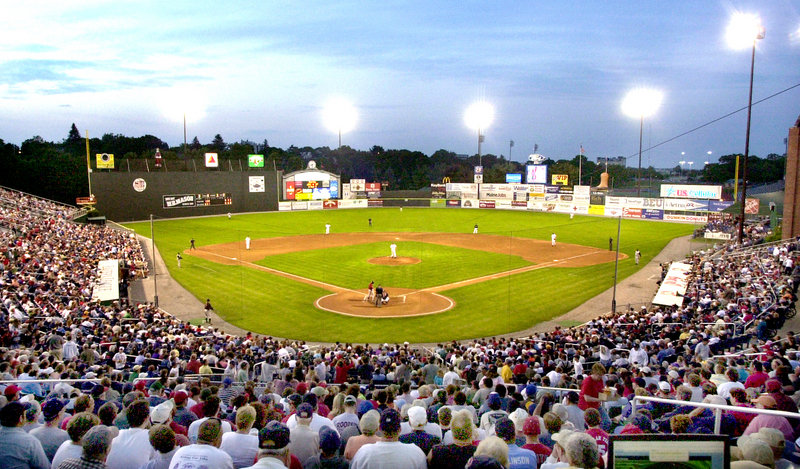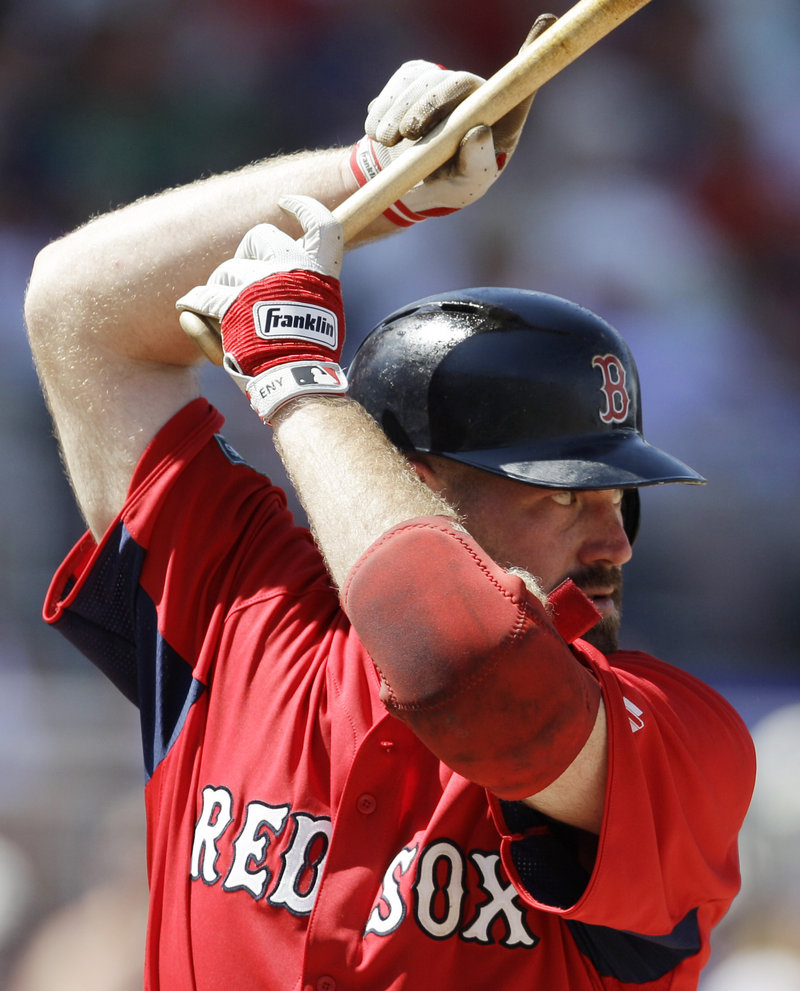PORTLAND — On a gorgeous September day in Portland nearly 10 years ago, the most popular pro sports franchise in Maine took on celebrity status.
The Portland Sea Dogs become more than a minor league baseball team. They became part of Red Sox Nation when, on Sept. 18, 2002, the Sea Dogs switched their affiliation from the Florida Marlins to the Boston Red Sox.
Now in its 10th season, the Sea Dogs-Red Sox relationship continues, providing Maine with minor league baseball along with a glimpse of future players for Fenway Park.
“When we switched affiliations, someone said it was like we had a hole-in-one and someone gave us a mulligan,” said team chairman Bill Burke.
Burke’s father, Dan, who died this past October at the age of 82, founded the Sea Dogs as an expansion team in the Eastern League, beginning play in 1994.
Every major league team has affiliated minor league teams to help develop players good enough to reach the big leagues. There are various levels in the minors, from the best players in Triple-A, then Double-A, and several stages of Class A.
Portland is a Double-A team, featuring players nearly ready for the major leagues. When the Sea Dogs were founded, two new major league teams were looking for minor league affiliates – the Colorado Rockies and the Marlins.
The Sea Dogs-Marlins relationship brought such emerging stars as catcher Charles Johnson, first baseman Kevin Millar, pitcher Josh Beckett and first baseman Adrian Gonzalez to Portland.
In its first season in 1994, Portland led the Eastern League in attendance, drawing 375,197 fans to an overhauled Hadlock Field.
“It said a lot about the fans in Portland,” Bill Burke said, “how much they supported us as a Marlins affiliate – with no logical affinity to the parent club.”
The Sea Dogs brand was everywhere, especially the black-and-teal caps with the creative logo, featuring a fierce-looking seal with a bat in its mouth.
“We were successful when we were with the Marlins,” Sea Dogs president Charlie Eshbach said. “We were Portland’s hometown team.”
After nine years, the already-successful franchise hooked up with the Red Sox phenomenon.
“And it became a whole different world,” Eshbach said.
NEW OWNERS BRING A GLEAM
In 2001, Florida Marlins owner John Henry sold his team and won the bid for the Boston Red Sox. His chief minority partner and chairman was Tom Werner.
Henry had a good relationship with Dan Burke when Henry owned the Marlins.
And Burke, the retired CEO of Capital Cities/ABC, had a longtime working relationship with Werner, a television producer.
“Once the new ownership took hold, there was a gleam in my eye,” Dan Burke would say later.
And the gleam was mutual. The new ownership group was eyeing Portland even before the sale was completed in February 2002.
“We first had discussions about this Jan. 17 (2002),” Phil Morse, a minority partner in the ownership group, and a University of Maine alum, said after the Sea Dogs affiliated with Boston.
Major league teams’ agreements with their minor league partners are called Player Development Contracts (PDCs) and are signed for durations of two or four years.
The PDCs for the Marlins and Sea Dogs, as well as the Red Sox and their current Double-A team in Trenton, N.J., were both due to expire after the 2002 season.
“The affiliations ended at the right time,” Bill Burke said. “John Henry goes from the Marlins to the Red Sox. My dad had known Tom Werner for 20 years. It was cosmic the way it lined up.”
Speculation about a potential Red Sox-Sea Dogs deal began soon after the new Boston owners took over. It became clear something was going on when Henry and Werner visited Dan Burke at a Sea Dogs game May 23.
On Sept. 18, 2002, the worst-kept secret was told in a press conference at Hadlock Field: Boston was moving its Double-A affiliation from Trenton to Portland.
“We look for this relationship to be long and prosperous, much like what we have with our friends at the Triple-A club in Pawtucket (R.I.),’ said Red Sox interim general manager Mike Port at the press conference. Pawtucket has been a Red Sox affiliate since 1973.
‘LIKE YOU’RE GOING HOME’
The much-anticipated opener in 2003 was a sellout. It was also postponed because of snow, as were the rest of the games that week.
“That first week was terrible but it also allowed us to have a little fun, too,” said Kevin Youkilis, the Red Sox All-Star who played in Portland in 2003. “We got to see the town of Portland and enjoy it.
“There was a lot of great food, music. Great energy in that town and it carried over to the baseball. Definitely one of my favorite places in the minor leagues.”
Kelly Shoppach, another Red Sox prospect, showed up in Portland at the end of April. He played in the poorly attended Florida State League the year before.
“In Portland, it was the first time I felt like I was a part of something,” Shoppach said. “First time I really felt like a professional baseball player in a real atmosphere.”
Attendance increased to a record 6,231 a game. The press box was expanded as media from all over New England visited. NESN began televising occasional games.
Fans weren’t just Sea Dogs fans, but Red Sox fans watching prospects.
Eshbach noticed a difference when a player was booed for not running at full speed.
“For nine years with the Marlins, if you saw one of our players not hustle down to first base, no one bothered to boo,” Eshbach said. “Now the fans become more animated because it means more to them.”
As new general manager Theo Epstein built up the minor league system, more prospects came to Portland. Those young players were already known before they got here, because Red Sox fans were following them from the time they were drafted and played in the lower levels.
And when they moved on to Pawtucket and Boston, fans could easily follow their progress.
Mark and Deirdre Nielsen of Falmouth have been fans of the Sea Dogs since the beginning. But now they are more attached to the players.
“With the Marlins, once the players left (Portland), you never saw them again and they were hard to follow,” Mark said. “Now they’re right in their own backyard.”
The Nielsens serve as a host family for the Sea Dogs, another popular aspect for the players.
Because summer housing can he expensive for minor league players, the Sea Dogs set up a network of host families to house players for little or no rent.
“Very loving people,” said Ryan Kalish, a former Sea Dogs player who stayed with the Nielsens. “With the host-family situation, it makes you feel like you’re going home at night. I still talk to the Nielsens today. Kind of like my second family.”
A THREAT IN MANCHESTER
Before Portland partnered with the Red Sox, another city wanted Boston’s Double-A team.
Manchester, N.H., wanted a team in the Eastern League. And the proposed owner, Drew Weber, preferred the Red Sox. Weber already owned another Red Sox affiliate, the short-season Class A team, the Lowell Spinners.
But the Sea Dogs secured the Red Sox affiliation before Weber could act. He eventually bought the New Haven, Conn., team and moved it to Manchester in 2004.
With another Eastern League team nearby, and closer to Boston, Sea Dogs officials were concerned that the Red Sox might be tempted to move.
To reassure the Sea Dogs, Epstein and the director of player development, Ben Cherington came to Portland on May 14, 2004, and announced they were extending the Player Development Contract four more years, through the 2008 season.
“It’s an unusual step,” Epstein said at the time, “and a step that is certainly warranted. There is no place else we would rather be.”
Dan Burke sounded relieved that day.
“We heard noise coming out of Manchester to the effect that maybe they had a favored relationship (with the Red Sox),” he said. “It turns out that was probably never true.”
KEEPING THE RED SOX HAPPY
The Sea Dogs continue to find players and coaches affordable housing. They have made improvements to the Hadlock Field playing surface.
But the Red Sox wanted one more thing – a clubhouse to replace the cramped space used in the Expo.
In 2007, the Sea Dogs negotiated a new lease with the city of Portland. The team built the new clubhouse past the right-field wall and received a break on the rent to eventually cover the cost.
With real plans for a new clubhouse in place, the Red Sox announced another four-year extension to the PDC, through 2012.
Last year the Red Sox added another extension through 2014. The Sea Dogs are hoping such extensions become routine announcements.
“We’re always asking if there’s anything else we can do,” Bill Burke said. “They seem happy.”
Cherington, now the general manager, said the Red Sox are pleased.
“Proximity to Boston and the facility, those are great things,” Cherington said. “But I think, more so, what matters to the players over the course of a season is to have a group they know is behind them.
“The Burke family and Charlie Eshbach have done that consistently. Anytime that there’s something, within reason, that we need for our players, they have come through. Those are things that don’t happen everywhere at every affiliate. It’s a great comfort to know that they do happen in Portland.”
Now in its 10th year, the combination of the Sea Dogs’ popularity with the fervor of Red Sox followers has produced an appealing product – for fans and players.
“The atmosphere there was awesome,” said Red Sox reliever Michael Bowden, who spent parts of two seasons in Portland. “That was my first glimpse of Red Sox Nation. I had a blast.”
Staff Writer Kevin Thomas can be contacted at 791-6411 or at:
kthomas@pressherald.com
Twitter: ClearTheBases
Copy the Story LinkSend questions/comments to the editors.






Success. Please wait for the page to reload. If the page does not reload within 5 seconds, please refresh the page.
Enter your email and password to access comments.
Hi, to comment on stories you must . This profile is in addition to your subscription and website login.
Already have a commenting profile? .
Invalid username/password.
Please check your email to confirm and complete your registration.
Only subscribers are eligible to post comments. Please subscribe or login first for digital access. Here’s why.
Use the form below to reset your password. When you've submitted your account email, we will send an email with a reset code.